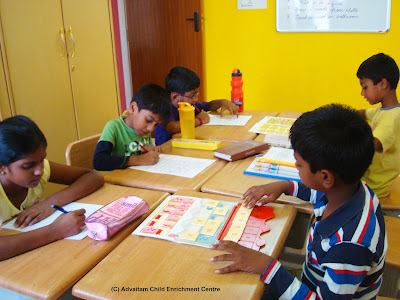How to improve reading comprehension of children
Reading comprehension is the ability of a child to read words / sentences / stories / questions etc and understand (make sense) meaning of the text and take appropriate action by way of writing a reply or by doing a physical action as per instruction.
Let us take one of the most common example of reading comprehension for your child: Exams! Your child has read all the textbooks in detail as part of the exam preparation. During exam your child makes a lot of mistakes or leaves questions without answering even though they know it when you ask them. Why does this happen? One of the main reason is that your child was unable to understand the question was because it was written in an indirect (tricky) way. Your child was unable to comprehend the question after reading it.
Reading passage and writing an answer is one of the common scenarios in English comprehension in schools. As the children go to higher grade or class the difficulty level of comprehension passages increases. For example reading a story and doing character analysis requires reading comprehension skills.
In Math, word problems issues are very common among children. This involves reading a sentence or sentences which conveys a specific scenario as a story and requires an answer in the form of a math calculation. Math word problems are probably the best example where each and every word in the problem could impact the final math calculation. Similarly science questions also requires accurate understanding.
This is by far the main reason why children try to learn by rote and when the same question comes in a different way, they are unable to answer.
Reading comprehension come in to effect every time you read anything. Some other examples are where reading comprehension comes in to picture
- Reading comprehension comes in to play when you are reading newspaper online/offline. What does the news convey?
- In a work environment let's say to have to submit a proposal for a RFP (request for proposal). You need to read through dozens or even hundreds of pages of customer requirement, summarize your understanding and come out with a solution.
- Reading an email consisting of instructions and carrying out the instructions by way of physical actions
- Reading a user guide for an electronic gadget and trying to troubleshoot a problem
Reading comprehension is probably the most difficult skills to master and it does take longer time than other skills to develop e.g. phonics, handwriting etc. In-fact reading comprehension evolves till you are well in to adult hood but the foundation is definitely laid during the preschool and primary school year.
Comprehending is the where the learning happens. You absorb the information and make sense of it as intended by the writer. Once this happens you can then use this learning and apply it in relevant scenarios.
Building vocabulary is one of the key aspects that helps in comprehending. A strong vocabulary means knowledge of words that when used in the right scenario will convey the message in total to the reader. The reader is thus also expected to have equal vocabulary to understand the meaning. Vocabulary builds over time and this involves a lot of reading.
Proper reading comprehension skills also helps you understand the gravity of the written word i.e. what is the writer conveying? Say, is the email conveying anger, displeasure, excitement, urgency etc?
So what should you do to ensure your child develops good reading comprehension skills:
- Preschool: This is where the foundation is built. Read a lot of books with your child. Read the sentence and explain the meaning. Joint story reading sessions helps boost their liking to reading. The more they read, the more they improve.
- Primary school: Introduce them to novels and story books. Slowly get away from comics (picture books) and get in to full text only books. This will work wonders in developing the reading skills.
- Secondary school: Introduce them to a variety of authors and genres. This will build their vocabulary in a big way.
- Teen years: Continue to engage them in reading new books, newspapers, blogs and articles. They will not only improve on reading comprehension but also develop strong spoken and writing skills.
It is never late to start, no matter how old your child is currently you can still start building the reading skills. As I mentioned earlier, reading comprehension develops well in to adulthood and there is always time for them to develop this essential skill.
The Indian education board has made significant changes in the exam structure and assessment system. This requires children to have good reading comprehension skills. They have introduced various research based projects which involves children to read lots of data points and writing their analysis of the situation. This is a welcome change and should continue.
Connect with us:
Website: http://www.advaitam.in
Activities: http://www.advaitam.in/home/after-school-activity-for-kids-hsr-bangalore
Facebook: https://www.facebook.com/ADVAITAM.IN/
Instagram: https://www.instagram.com/advaitamhsr/
Twitter: https://twitter.com/advaitam_in
LinkedIN: https://in.linkedin.com/company/advaitam-child-enrichment-centre
Connect with us:
Website: http://www.advaitam.in
Activities: http://www.advaitam.in/home/after-school-activity-for-kids-hsr-bangalore
Facebook: https://www.facebook.com/ADVAITAM.IN/
Instagram: https://www.instagram.com/advaitamhsr/
Twitter: https://twitter.com/advaitam_in
LinkedIN: https://in.linkedin.com/company/advaitam-child-enrichment-centre








Comments
Post a Comment